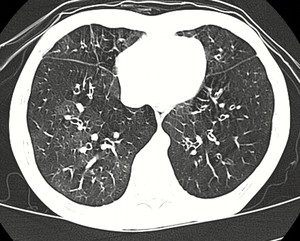Bronchiolitis obliterans
| Bronchiolitis obliterans | |
|---|---|
| Synonyms | obliterative bronchiolitis (OB), constrictive bronchiolitis (CB), bronchiolitis obliterans syndrome (BOS), popcorn lung |
 |
|
| High resolution CT scan showing bronchiolitis obliterans with ground glass opacification, air trapping, and bronchial thickening | |
| Classification and external resources | |
| ICD-10 | J44.8, J68.4 |
| ICD-9-CM | 491.8 |
| DiseasesDB | 1704 |
| MeSH | D001989 |
Bronchiolitis obliterans (BO), informally known as popcorn lung, is a disease that results in obstruction of the smallest airways of the lungs (bronchioles) due to inflammation. Symptoms include a dry cough, shortness of breath, wheezing, and feeling tired. These symptoms generally get worse over weeks to months. It is not related to organizing pneumonia.
Causes include breathing in toxic fumes, respiratory infections, connective tissue disorder, or following a bone marrow or heart-lung transplant. Symptoms may not occur until two to eight weeks following toxic exposure or infection. The underlying mechanism involves inflammation that results in scar tissue formation. Diagnosis is by CT scan, pulmonary function tests, or lung biopsy. A chest X-ray is often normal.
While the disease is not reversible treatments can slow further worsening. This may include the use of corticosteroids or immunosuppressive medication. A lung transplant may be tried. Outcomes are often poor with most people dying in months to years.
Bronchiolitis obliterans is rare in the general population. It affects about 75% of people by ten years following a lung transplant and up to 10% of people who have received a bone marrow transplant from someone else. The condition was first clearly described in 1981. Prior descriptions occurred as early as 1956.
Bronchiolitis obliterans is a lung disease characterized by fixed airway obstruction. Inflammation and scarring occur in the airways of the lung, resulting in severe shortness of breath and dry cough.
...
Wikipedia
